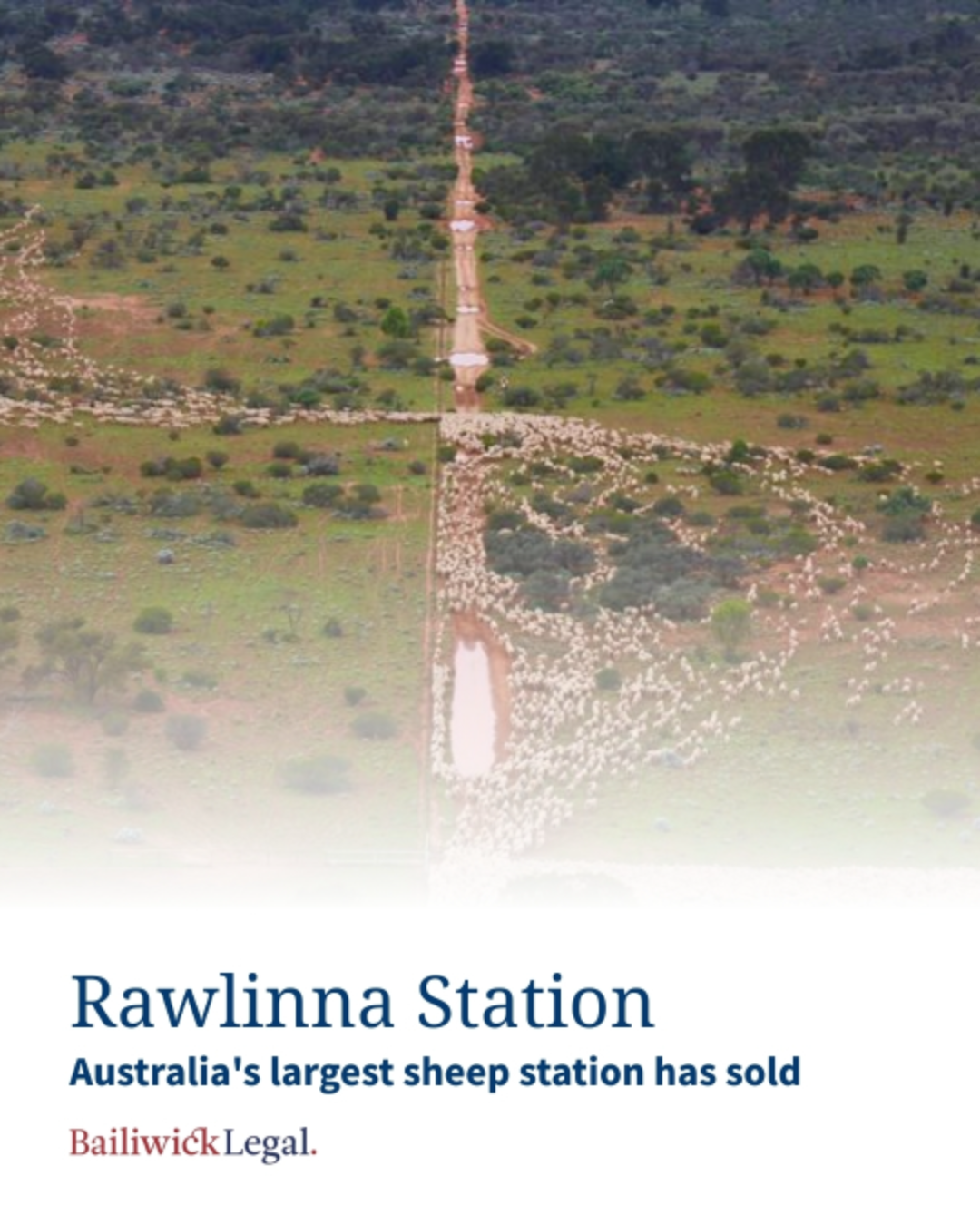Landowner's Rights with Gas Exploration and Access to Farm Land
February 19, 2026
Author name
With the moratorium on exploration of on shore gas resources being lifted in the northern regions of the State, oil and gas companies are now seeking access to farming land to determine the location and size of reservoirs.
If you are approached by a petroleum explorer seeking access to your land, it is important that you understand your rights and consider the impact that exploration may have on your farming operations.
We have prepared this article to assist farmers in the initial stages of dealing with land access requests. In later articles in this series, we will discuss (in further detail): land access agreements, compensation for land access and what happens when access and compensation cannot be agreed.
Landowner’s rights
Petroleum activities in Western Australian are governed by the Petroleum and Geothermal Energy Resources Act 1967 and related regulations.
Some key provisions to be aware of are:
- An Operator (the company responsible for any activities taking place on a Petroleum Title) must obtain written consent to access private land;
- The Operator must negotiate compensation with the land owner (to compensate the landowner for loss and damage, including for disruption of farming activities);
- Activities may not commence until an agreement between the landowner and Operator has been reached; and
- If compensation cannot be agreed during negotiations, the Magistrates Court has the power to fix the amount of compensation.
It is important that the agreement between a landowner and Operator is fully and accurately reflected in a written contract. In 2015, Bailiwick Legal assisted with the development of a model agreement to assist farming landowners and petroleum operators to determine and document fair and equitable terms for access. See: https://www.appea.com.au/media_release/oil-and-gas-and-farming-industries-endorse-new-framework-for-coexistence-in-western-australia/
for copies of the agreement template and supporting information.
Can access be denied?
Access can only be denied in very limited circumstances. Where the land is:
- Private land not exceeding 2000 m2;
- Used as a cemetery or burial place; or
- Less than 150m from any cemetery or burial place, reservoir or any substantial improvement,
the landowner has the discretion to withhold consent to access for exploration.
Negotiations – things to consider
1. Operator’s proposed activities
When considering a request for land access, it is crucial to understand exactly what activities the Operator is proposing to carry out, where these activities will take place, and a timeline for such activities.
These activities may include carrying out surveys, drilling and rehabilitation, and the construction of required infrastructure (such as roads, gravel pads, bores, workers quarters, fencing, power supply networks and wells). You should consider how intrusive each activity is likely to be, and seek confirmation of the likely time period for each.
2. Impact on your farming operations
It is equally important to consider your own farming program. Exploration activities may impact your farming operations by requiring the relocation of stock or to stop cropping activities, effecting water supplies and access on your farm and /or creating security, biosecurity and safety hazards.
3. Minimizing the effects of exploration on your land
We suggest that you prepare a comprehensive plan of your current and future farming operations prior to finalising any agreement for land access, so that you may properly consider the impacts of exploration, and the measures available to minimise disruption and loss.
Some measure to consider include:
- Agreed compensation (including for loss of income, disruption, professional advice, and any devaluation of your land);
- Changes to your farming plan / operations;
- Negotiating changes to the proposed activities and / or time frames with the Operator; and
- Whether your farming operations or land can benefit from retaining any of the Operator’s infrastructure after exploration has ended.
Seeking Professional Advice
Under the model agreement, Operators are liable for the reasonable costs of a landowner seeking advice, including legal, financial or technical advice, in relation to a land access agreement and/or proposed exploration activities. If approached, we recommend that you seek professional advice to assess, negotiate and document access and compensation arrangements.
If you would like assistance with negotiating the terms of a land access agreement, or for further information in relation to how the above matters may affect your farming operations, please contact us on (08) 9321 5451 or by email at phil@bailiwicklegal.com.au.
For further information about our legal services, please visit our website: https://www.bailiwicklegal.com.au/
The above information is a summary and overview of the matters discussed. This publication does not constitute legal advice and you should seek legal or other professional advice before acting or relying on any of the content.

Bailiwick Legal has been honoured to support Forever Wild over the past few years as they delivered one of the most significant conservation land acquisition programs undertaken in Western Australia. Our team assisted Forever Wild with the strategic purchase of four pastoral stations, Narndee , Boodanoo , Meeline and Challa , transactions that now connect three State Reserves and protect more than 12,000 square kilometres of land. To put that scale into perspective, the combined area is approximately five times the size of the ACT and nearly one-fifth the size of Tasmania . Navigating complexity at scale These were not straightforward property transactions. Each acquisition involved: Multiple pastoral leases Layered regulatory and approval pathways Significant operational and on-ground assets Numerous stakeholders across government, industry and land management Our role was to guide Forever Wild through this complexity with clarity, precision and confidence, ensuring each transaction progressed efficiently while managing risk and safeguarding long-term objectives. “ Forever Wild is creating a world-leading model for nature funding that demonstrates we can manage viable, working pastoral stations whilst also restoring and protecting local ecological flora and fauna, and engaging and supporting Indigenous people and local communities. Complex & challenging, but this initiative could literally change the world .” Jessica Brunner - Director, Bailiwick Legal A growing and evolving legal landscape Large-scale conservation acquisitions sit within an emerging and increasingly complex legal field , intersecting land tenure, pastoral regulation, environmental frameworks and commercial considerations. These matters demand a deep understanding of both the legal mechanics and the practical realities of operating in regional and remote Australia. Our team’s experience in agribusiness, pastoral land transactions and regulatory approvals allowed us to support Forever Wild at every stage, from strategic structuring through to completion. Proud to support leadership in nature finance Forever Wild is widely recognised as an industry leader and a steadfast advocate for nature finance initiatives , helping pave the way for greater accessibility and innovation in conservation funding and land stewardship. We are proud to have contributed our relationships, expertise and practical legal insight to help Forever Wild achieve its vision, and to have played a role, however small, in shaping a groundbreaking future for conservation in Australia. At Bailiwick Legal, we value the opportunity to work alongside organisations that are thinking long-term, acting boldly, and creating outcomes that extend well beyond the transaction itself. For assistance with all of your agribusiness needs, contact Bailiwick Legal on 08 9321 5451 or email office@bailiwicklegal.com.au For further information about our legal services, please visit our website: https://www.bailiwicklegal.com.au The above information is a summary and overview of the matters discussed. This publication does not constitute legal advice and you should seek legal or other professional advice before acting or relying on any of the content.

Bailiwick Legal Advises on Landmark Acquisition of Rawlinna Station by Consolidated Pastoral Company
Bailiwick Legal is proud to have acted for Consolidated Pastoral Company (CPC) in its successful acquisition of Rawlinna Station , Australia’s largest sheep station, located on the remote Nullarbor Plain in Western Australia. Spanning over 1 million hectares and running approximately 30,000 sheep , Rawlinna is an iconic pastoral asset with a rich legacy, having been held by the MacLachlan family’s Jumbuck Pastoral Company since its establishment in 1962. The sale marks the first change of ownership in over six decades and was finalised following formal approval from the Western Australian Government for the transfer of the pastoral leases. This transaction involved navigating: The transfer of three separate pastoral leases Coordination across multiple vendor entities Consideration of livestock and operating assets Fulfilment of regulatory and compliance requirements, including WA lease approval processes Bailiwick Legal is a boutique agricultural and regional law firm , proudly based in Perth and Bridgetown, Western Australia. Our role in this acquisition demonstrates that deep sector knowledge, local insight, and personalised legal support are crucial for agribusiness clients managing complex, high-value transactions. Our team, led by our regionally-based solicitor, Matilda Lloyd, provided end-to-end legal and strategic support, including: Due diligence on land tenure and operating assets Contract negotiation and preparation Advice on regulatory approvals and compliance Strategic coordination with CPC’s internal and external stakeholders to ensure a smooth and timely settlement We are honoured to have supported CPC in this milestone acquisition and look forward to watching Rawlinna’s next chapter unfolds. At Bailiwick Legal, we believe that regional expertise, deep industry knowledge, and relationship-based service remain essential to agribusiness success, no matter the scale. Congratulations to all parties involved, including the MacLachlan family, whose stewardship of Rawlinna leaves a lasting legacy in Australian agriculture. – The Bailiwick Legal Team Working alongside agribusinesses to grow, transition, and thrive . For assistance with all of your agribusiness needs, contact Bailiwick Legal on 08 9321 5451 or email office@bailiwicklegal.com.au By Matilda Lloyd (Associate) For further information about our legal services, please visit our website: https://www.bailiwicklegal.com.au The above information is a summary and overview of the matters discussed. This publication does not constitute legal advice and you should seek legal or other professional advice before acting or relying on any of the content.











